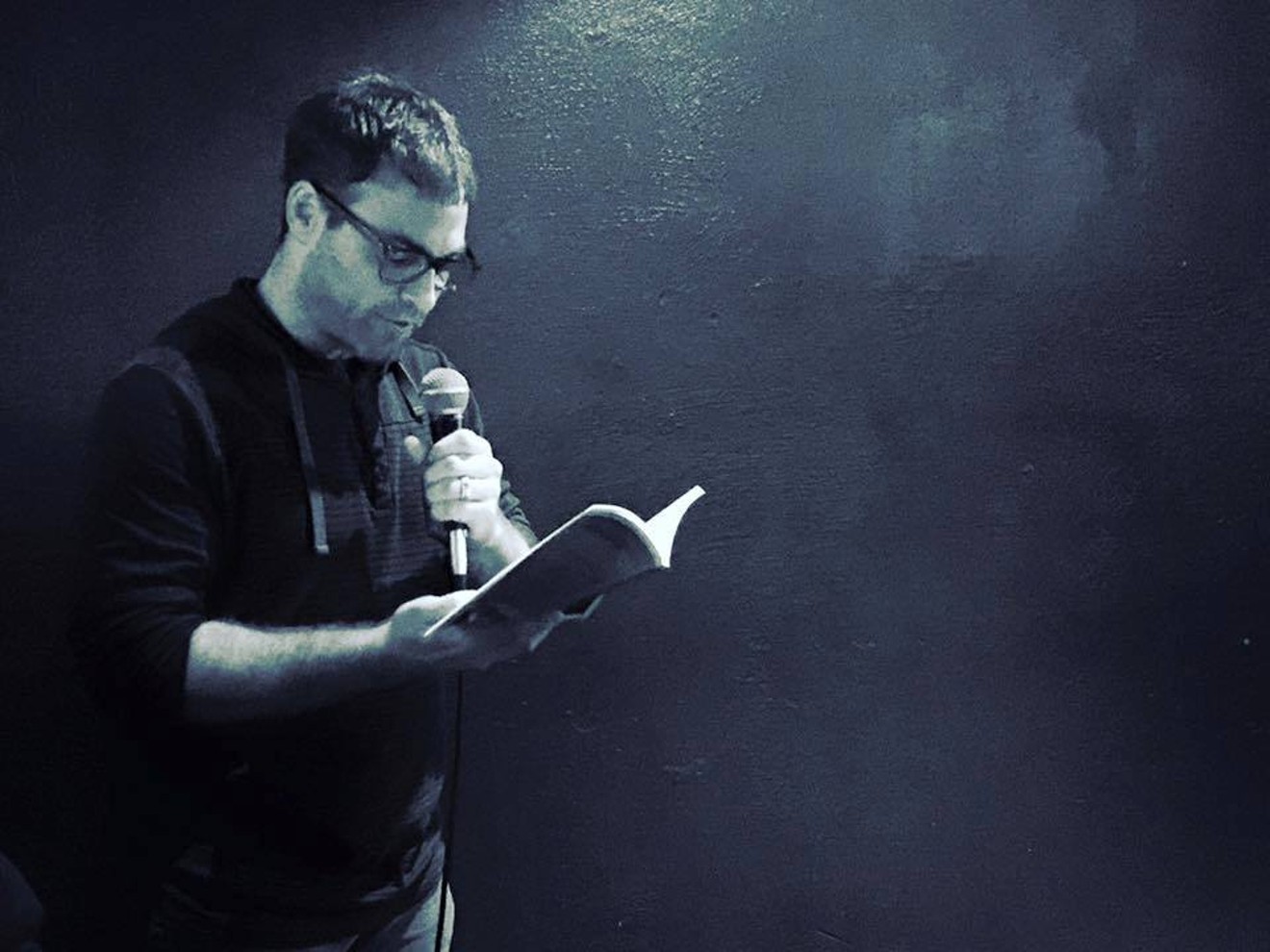Denver lit fans might already know local writer Michael Pool from his work with the always-entertaining Noir at the Bar fiction reading series. What even his fans might not know is that Pool is striking out on his own in the publishing world, claiming a stake in the mystery genre by establishing P.I. Tales Publishing, providing authors as in love with noir as he is the opportunity to get their work in print and in the hands of fans.
We spoke with Pool about writing noir crime fiction, the challenge of the publishing market today, and where the mean streets in Denver might give rise to his next books.
Westword: You're starting up P.I. Tales Publishing in order to feature "modern detectives" with "classic style." What does that mean for you specifically?
Michael Pool: That’s a great question. In addition to being a crime and mystery author, I also work full-time as a private investigator. I’m a big fan of authors from the so-called golden age of crime fiction, from Dashiel Hammett to Raymond Chandler and Ross Macdonald. What strikes me about reading those authors’ books is how the human elements of their world transfer into the modern context perfectly, but much of the social and investigative landscape is different than the one we live in today.
Phillip Marlowe, Sam Spade and Lew Archer are iconic, timeless characters. I wanted to create modern iconic characters that inhabit our time and space, as well as our social norms. One of the reasons I chose a female detective (Riley Reeves) for the first P.I. Tales series is because I have worked with some very shrewd female detectives in my real investigative work. I wanted to create an iconic detective like them as well as the indomitable women I grew up around in East Texas.
How did the idea for this publishing venture come about? What made it necessary in today's market?
I wanted to create something larger than one book series or character, a collection or world that was intertwined, then bring in other authors to inhabit that world with their own creations. There are a bunch of amazingly talented people writing in the P.I. or hard-boiled genre right now. My goal is to create a platform to launch their stories beyond the medium of novels into comics, film, television and beyond.
Technology has been a great equalizer in creative enterprises over the last twenty years. Lots of creators have had success harnessing that power to go their own way in the marketplace rather than depending on big, inflexible corporate companies to make their creations succeed. Once you start getting wrapped up in restrictive contracts, it can be hard to maintain the necessary rights required to pivot your intellectual property quickly into other mediums or formats. As I said, I want P.I. Tales to be about more than one book, series or medium. The only way I could envision doing that well was to become the publisher from the ground up.
So how did you feel qualified to start something like this? It feels like an idea that lots of writers may have had, but something with which few have followed through.
I have a Master of Fine Arts degree in popular genre writing and commercial fiction from Western Colorado University down in Gunnison (where I lived for almost a decade), and as much as studying the craft of writing, I learned a tremendous amount about functioning in the business of writing. I feel like my post-secondary education prepared me to take on publishing as a business. Make no mistake, we intend to be highly successful at this. I know we will produce amazing entertainment, and we have a strong, flexible plan in place to get that content out into the marketplace at the highest levels.
You've been the organizer for the Noir at the Bar reading series for a while now; how will P.I. Tales interact with that ongoing venture?
You know, I’m not totally sure. By which I mean that I would not want my own project and brand to overshadow or take attention from the other authors at a given Noir at the Bar Denver event. Noir at the Bar is very much about writers communing with other writers while sharing their work with an audience of people that transcends their everyday likely readers. I enjoy hosting it, and for sure we will give away P.I. Tales swag at future events. But Noir at the Bar doesn’t belong to anyone; the whole spirit of the worldwide series of events is grassroots, with writers working together to put on a great show and make new friends. I would never want to take away from that. Could we do a P.I.-themed Noir at the Bar in the future? Stay tuned to find out.
The premiere book in the line will be one of your own, Throwing Off Sparks, the first book in what aspires to be an ongoing Riley Reeves mystery series. Can you talk about how that book encapsulates what you're wanting to do with P.I. Tales overall?
Riley is a character I originally created for a short story called “Weathering the Storm,” which was published in October of 2019 as part of an anthology from Down and Out Books called The Eyes of Texas: Private Eyes From the Panhandle to the Piney Woods. The anthology's editor ended up nominating it for a Shamus Award, although I have no idea if it will make the final cut. Riley’s series begins in Tyler, Texas, where I grew up. She’s in a lot of ways an amalgamation of women I have known and respected in my life. But what’s strange is that, although Riley is the first female protagonist I have ever written at length about, there is a strong part of me in her, and it’s what I love about her. She is my favorite character I have written so far.
I was only about a page into writing the short story, and I already knew this was a character I wanted to write a series of books about. Riley is an unstoppable force, to be underestimated at one’s peril. But at the same time, she has a loving and helpful mindset that readers will identify with. She also has some flaws, and they get her into trouble from time to time.
I want every P.I. Tales series to have that sense of the case not unfolding in a vacuum, to delve into the characters themselves and their lives outside of work, as well as how these two elements press against each other in occasionally destructive ways.
So tell us a little more about Throwing Off Sparks; how does it set itself apart from the other mystery series out there? Every new title has to carve out its own bit of the noir landscape, right?
I would say it's important to distinguish between hard-boiled and noir as subgenres. Riley is very much a hero rather than an anti-hero, which would put her more in the hard-boiled rather than noir category. Riley is a moral, dedicated woman with a great desire to help others through her work. She specializes in cases of missing or at-risk girls (traversing a man’s world on her own terms with her head up and shoulders back), and regularly finds herself wading into danger for the good of those she feels driven to protect. Her flaws are not personal vices that will destroy her, but rather professional vices that exist as a result of her need to set the world right.
What mystery novels inspire you and set the stage for this new publishing enterprise?
It might be good to discuss a few modern P.I. series I read. I love Robert Crais’s Elvis Cole series, and I enjoy Sam Wiebe’s Dave Wakeland series, as well. Both do an excellent job of bringing iconic characters into the modern environment. Classic P.I.s: Ross MacDonald’s Lew Archer is my favorite. And, of course, Kinsey is a big favorite; I think most mystery readers love that iconic series.
But I do read outside of the mystery genre, as well. I’m a lifelong lover of books. They have helped me through some tough times. One of my greatest inspirations and lifelong loves is Raymond Carver, and my writing style has always trended toward his workingman’s prose and the way he finds depth in seemingly shallow or benign moments. Life really is like that — much less about the spectacular, much more about the slow burn of things coming apart and needing repair. The title Throwing Off Sparks is derived from a Raymond Carver quote in his collection Where I’m Calling From. Fans of his work will almost certainly see his influence on my own work. I grew up with a severe alcoholic for a father, so alcoholism and drug addiction run through almost all of my crime fiction, because they have run through much of my personal experiences.
What about the mystery genre do you think speaks to its longevity? This is a medium that's been popular among readers for well over a century now.
Humans have a great love for the unknown. And we love the process of bringing order back to chaos to banish the unknown from our midst. A good crime or mystery novel does this through solving the plot, and I think there is something primal we recognize in that, something we crave. It explains the popularity of True Crime podcasts, too. Mysteries thrill us but also allow us to experience the unknown from a safe distance. Monsters live in the unknown. Great thinkers like Carl Jung pointed out brilliantly how the roots of our stories come straight from our primal days fighting monsters out in the real unknown, where our very survival was at stake. That's where the idea of a hero comes from in the first place, and thus we unconsciously love to see the hero’s journey play out in our art and entertainment. It's in our DNA.
So what's the most noir spot in Denver? Think it'll ever make it into one of your books?
I mean, the cliché answer is East Colfax! A lot of dashed hopes and dreams on that storied thoroughfare. But Denver has lots of cracks and crevices people are falling through, more every day as the cost of living continues to rise. I’ll be writing a second P.I. Series set in Denver for P.I. Tales — the Rick Malone series — so you will definitely be seeing some Denver darkness from me. Rick's first book, One Way Out, is almost finished. Rick is described as a “Gonzo” P.I., a nod to Hunter S. Thompson, another of my favorite writers. He’ll definitely be exploring the counterculture and vibe that makes Colorado so unique and special.
See more about Michael Pool’s P.I. Tales Publishing on its website; his Throwing Off Sparks debuts in May.
[
{
"name": "Air - MediumRectangle - Inline Content - Mobile Display Size",
"component": "12017618",
"insertPoint": "2",
"requiredCountToDisplay": "2"
},{
"name": "Editor Picks",
"component": "17242653",
"insertPoint": "4",
"requiredCountToDisplay": "1"
},{
"name": "Inline Links",
"component": "18838239",
"insertPoint": "8th",
"startingPoint": 8,
"requiredCountToDisplay": "7",
"maxInsertions": 25
},{
"name": "Air - MediumRectangle - Combo - Inline Content",
"component": "17261320",
"insertPoint": "8th",
"startingPoint": 8,
"requiredCountToDisplay": "7",
"maxInsertions": 25
},{
"name": "Inline Links",
"component": "18838239",
"insertPoint": "8th",
"startingPoint": 12,
"requiredCountToDisplay": "11",
"maxInsertions": 25
},{
"name": "Air - Leaderboard Tower - Combo - Inline Content",
"component": "17261321",
"insertPoint": "8th",
"startingPoint": 12,
"requiredCountToDisplay": "11",
"maxInsertions": 25
}
]












